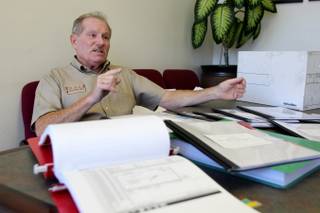
N.A.C. Electric owner Tom Clift talks about the ways he former accountant embezzled money from his small business May 2, 2013.
Published Wednesday, May 8, 2013 | 2 a.m.
Updated Thursday, May 9, 2013 | 11:38 a.m.
Sun coverage
A billing statement for an Office Depot credit card helps tell the story of how a trusted bookkeeper bilked a small Las Vegas electrical company out of a six-figure sum.
The expenses listed for a one-month period in 2010 make Tom Clift, owner of N.A.C. Electric Inc., shake his head and cringe. There’s a $36 charge at a nail salon, $52.93 at Best Buy, $24.86 at the Disney Store, $128.61 to Allstate and numerous purchases at Target. And that’s just a sample.
As for actual office supplies, the billing statement offers only one hint at such a purchase: a $111.89 charge at Office Depot.
“If you sit and dissect it a little, you can understand it better,” Clift said recently as he sorted through thick, colored binders filled with bank statements, copies of checks and other financial documents. “It was very sophisticated.”
This is the evidence Clift, 58, and family members compiled and supplied to Metro Police, which led to the arrest of his company’s bookkeeper, 45-year-old Ana Ocegueda. Police and prosecutors say Clift’s story — one of trust, loyalty and perhaps a little naïveté — isn’t unique. The fraud unit at the Clark County District Attorney’s Office receives three to six cases each month that involve thefts greater than $250,000, said Chief Deputy District Attorney Jay P. Raman.
“A lot of these victims are small businesses — mom-and-pop organizations,” Raman said.
The statement accurately describes Clift, a mild-mannered man who started his career as an electrician in high school and then studied to pass a state contractor’s test to open his own electrical company five years ago.
He considered Ocegueda a friend. They worked together at another electrical company in town, so when Clift decided to start his own business, he asked Ocegueda to come along.
“I figured this was a good match,” Clift said. “I’ll do the electrical work and you do the accounting work, and things are good — or so we thought.”
The Metro arrest report details years of deceit in which Ocegueda wrote checks to herself, completed direct deposits to herself, misused company credit cards and wrote fraudulent checks from Clift’s and his wife’s bank accounts. Total damage: $366,844.13.
The Clark County District Attorney’s Office charged Ocegueda with 33 counts of theft and three counts of unlawful acts regarding computers, according to a criminal complaint filed in September 2012. Court documents indicate Ocegueda, married with two children, has remained out of custody on bond.
During Ocegueda's District Court arraignment in December, the prosecution and defense announced a plea agreement. Ocegueda pleaded guilty to two counts of theft — both category B felonies, the second highest felony category. She will be sentenced Thursday morning in District Court.
• • •
Only about 15 percent of the nation’s fraud victims report the crimes to law enforcement, a scenario fueled by victims’ shame, guilt or embarrassment, according to the U.S. Attorney’s Office.
When it comes to large-scale fraud or embezzlement at small businesses, the thief is often an office manager or bookkeeper granted too much trust, Raman said. They tend to be middle-aged employees with some schooling and no criminal history, he said.
“They’re like the aunt that is not really the aunt,” he said. “They’re super involved in the owners’ lives.”
Clift said he and his wife, Janie, didn’t frequently socialize with Ocegueda outside of the office, but they did throw her a $1,000 baby shower and occasionally would grab drinks with her after work.
The work relationship developed trust. Clift relied on Ocegueda to manage the company’s books — he had no idea how to operate the computer accounting program — and inform him of the business' profits or losses, he said.
N.A.C. Electric Inc. always seemed on the brink financially, Clift said. One time he even took out a loan to cover salaries.
“In reality, I was making a lot of money,” he said. “I was doing things right, but it just wasn’t showing.”
Ultimately, Clift's wife unraveled the fraud after she received an invoice with a late notice from a credit card company. She had never used that card.
Several weeks later, Clift said Ocegueda abruptly left the office one day and didn’t return. They met a week later at a restaurant near the 215 Beltway and Flamingo Road, where Clift said Ocegueda confessed to stealing money.
At the time, Clift didn’t realize the scope of the embezzlement.
“I thought we were talking five or 10 grand,” he said.
Clift’s experience, which involved laying off employees and rebuilding his business, should serve as a cautionary tale, said James Beatty, a detective in Metro’s fraud detail.
“Most businesses don’t do a yearly audit,” Beatty said. “I understand the cost behind those can be quite large … but just have someone else look at the books who is not your bookkeeper.”
Many businesses discover fraud when their bookkeeper goes on vacation, he said.
Beatty said Metro investigates all cases of suspected fraud, regardless of dollar amount. Some of the cases — those involving sums in the hundreds of thousands of dollars — can take years to investigate because of the complexity and length of embezzlement, he said.
One high-dollar case Beatty is investigating involves embezzlement that began a decade ago, he said.
“Whenever you start digging, you find more and more,” he said.
Greed and sloppy work tend to out embezzlers, like most criminals, Raman said. A keen eye for detail can eventually uncover the fraud, whether embezzlers are writing themselves checks, misusing corporate credit cards, taking payments from vendors or pocketing cash, he said.
But why do trusted employees risk everything to steal?
Motivation varies by case, but Raman said many people commit fraud to support a gambling habit, drug addiction or simply to pay mounting bills. People who feed embezzled money into local casinos, he said, often operate under this notion: “If I win, I’ll pay it back.”
“It never happens,” he said. “They get deeper and deeper in debt.”
Raman places some blame on society, where people participate in what he calls “willful blindness” — ignoring warning signs when a person’s job and outward signs of wealth don’t seem to add up.
“People assume someone is doing something wrong, but they’re willing to look the other way because they’re benefiting,” Raman said.
• • •
When Ocegueda appears Thursday before Judge Valerie Adair, she could wind up on probation or be led away in handcuffs.
Clift hopes it’s the latter. He’s angry. He said he and his wife fought about the ordeal for six months. They could have paid off their house and vehicles and not had to lay off hard-working employees. Instead, Clift arrives to the office by 5:30 a.m. and leaves 14 hours later.
Clift wants Ocegueda to serve 3 1/2 years in prison. Because of the embezzled funds, those are the extra years Clift will have to work before he'll be able to retire, he said.
As part of the plea agreement, Ocegueda was ordered to pay restitution totaling $366,844.13. But Raman said most fraud victims never recoup all that was stolen, even if a defendant receives probation and, in theory, can work.
“I wish the enforcement mechanisms were better to get the money back,” he said.
Clift said he planned to file a civil lawsuit against Ocegueda after her sentencing, which he will attend. Clift and his wife mostly just want to know why she betrayed them.
He doesn’t expect to ever fully know that answer, so Clift said he will settle for this: “I want to see the handcuffs go on and her walking out the back door, not the front door.”
CORRECTION: This version corrects the number of Ocegueda's children, which was incorrectly reported in court documents. | (May 9, 2013)


Join the Discussion:
Check this out for a full explanation of our conversion to the LiveFyre commenting system and instructions on how to sign up for an account.
Full comments policy